This is the final Post for the Month of February 2019 – and we have saved this one , which I think (and hope) is rather special as it concernes one of our greatest stage actors of the last century – namely Sir Donald Wolfit.
The last of the actor-managers taking Shakespeare on tour: Donald Wolfit
I have just listened to a half hour programme from Radio 4 in the Great Lives series on Donald Wolfit. Ned Sherrin presented it who had worked in his Theatre Touring Comany as had Ronald Harwood who also contributed and had been Sir Donald’s Dresser for 7 years – so knew him well.
Ned Sherrin described him as a Stage Actor who he regarded as one of the Greatest Actors of the Twentieth Century – certainly the equal if not better than Olivier and Geilgud. Donald was not liked by these two or Ralph Richardson who Ned stated was jealous of Donald’s ability to play the great Shakespearean roles which he could not do.
Donald Wolfit took Shakespeare to the people and toured extensively in Britain and overseas. More below about his dramatic lunchtime Shakespearean performances at the Strand Theatre during the height of the Blitz – something that has got to be greatly admired.
Donald Wolfit as Hamlet, Shakespeare Memorial Theatre, 1936-7
One of the great British stage actors of his era Donald Wolfit was noted for his magnificent portrayals of King Lear and Tamburlaine.
Quite a few years ago theatrical companies in England were run by actor-managers who performed with their own companies in London, at theatres in the regions, and abroad. According to Hesketh Pearson, in his book The Last Actor-Managers, “most of them won their reputations by playing the great Shakespearean characters; and though they often adapted the plays…it was entirely due to them that Shakespeare, or mangled Shakespeare, held the stage from the reign of Charles II to the reign of George V.”
Donald Wolfit, born in 1902, was too late to truly be an actor-manager.
In spite of early success working at major theatres like the Old Vic, he always felt himself to be an outsider and yearned for his own company.
In 1936-7 he spent two seasons at the Shakespeare Memorial Theatre in Stratford-upon-Avon. In his first season his varied roles included Orsino in Twelfth Night, Cassio in Julius Caesar, Gratiano in The Merchant of Venice, Ulysses in Troilus and Cressida and Kent to Randle Ayrton’s magnificent King Lear. His Hamlet gained him national recognition. In his autobiography, First Interval, he wrote about the curtain-call for his first performance: How well I remember that first Hamlet at Stratford, the opening of the great parti-coloured curtain and the step forward to find out whether the great struggle in Hamlet’s sould had really been imparted to the audience.
He became famous for his curtain-calls at which he always appeared exhausted, holding on the curtain for dramatic effect. In 1937 he repeated his Hamlet and added Iachimo in Cymbeline and the Chorus in Henry V.
All called for the vocal skill and powerful personality which Donald Wolfit had in abundance.
During his years in Stratford he met and fell in love with the actress Rosalind Iden, and soon after he created a theatre company of his own using actors who he had worked with in Stratford. From 1937 onwards touring became a way of life for him. He performed right through the war, aiming “to be the switch that could set the electric current of Shakespeare’s poetry and imagery throbbing through a crowded auditorium”.
Between 1937 and 1945 he estimated he had undertaken 2240 performances of 15 different plays in countries including Canada, the USA, Egypt, France and Belgium and continued to tour after the war.
Donald Wolfit and Rosalind Iden’s recording of Scenes from Shakespeare
Receiving a knighthood in 1957 brought him respect, particularly abroad. According to Ronald Harwood’s article in the Dictionary of National Biography: Wolfit believed in the theatre as a cultural and educational force. His contribution was immense, for he provided people all over the British Isles, especially during the war, with the opportunity of visiting a playhouse, perhaps for the first time, and seeing Shakespeare with the leading roles played by an actor of extraordinary gifts.
He did have extraordinary gifts, even though his style has remained somewhat out of fashion here at home.
He undertook a new tour of the provinces and travelled to Kenya and Ethiopia where he and his wife Rosalind performed “a programme of extracts from their Shakespearian repertoire”, for which they became renowned. From 1959-60 They toured to Australia, New Zealand, India, Kuwait and Beirut, a journey of 29,000 miles. In 1963 he performed in South Africa and Zimbabwe, visiting Harare, Cape Town and Johannesburg, insisting on giving a performance for non-whites.
He also visited Kenya again, where he was seen by a young Felicity Howlett. His visit there impressed this young girl to such an extent that it virtually changed her life. This is her memory of that visit Donald Wolfit made to Kenya :-
My father was the lighting director at the National Theatre, Nairobi and in 1963 Sir Donald Wolfit and his wife, Rosalind Iden, were invited to Nairobi to give some of their pieces from Shakespeare. They gave some wonderful, nowadays I would think “over-the-top”, performances. I particularly remember the death scene from ‘Othello’ and the mad Lear. I was about 14 at the time and had never seen anything quite so captivating and I used to stand in the wings watching in awe. One night as Donald Wolfit came off stage he patted me on the head and said “do you like Shakespeare, little girl”. I simply nodded, too taken aback, by this great actor actually speaking to me, to say anything!
When they came to leave Nairobi they presented me with a signed copy of the Complete Works which has become my most treasured possession.
Felicity Howlett’s Complete Works open at Hamlet, with part of the original cover
The inscription reads “from another lover of Shakespeare”.
Ronald Harwood’s play and film The Dresser was based on his experiences as Wolfit’s dresser, and his observation, repeated in his biography, confirms Felicity’s impressions and that delightful inscription:
He developed a majestic persona, grandiose, passionate, often pompous. He could be frightening and brutal but also astonishingly kind and genuinely humble.
It may have belonged to a previous era, but his barnstorming style made a big impact, not least on Felicity in whom Wolfit inspired a life-long love of Shakespeare.
She has lived for many years in Stratford-upon-Avon where she continues to follow the RSC’s work, and it is very kind of her to these memories and share photographs of her treasured copy of the Complete Works.
Donald Wolfit had plenty of admirers. The lunchtime Shakespeare shows he put on at the Strand Theatre at the height of the Blitz, heedless of air-raid warnings, were praised for raising Londoners’ spirits. The critic Kenneth Tynan rode to his defence and Edith Sitwell said Donald Wolfit’s performance as Lear left her “unable to speak”.
At this time during the War a German bombing raid has caused great damage to the Strand Theatre
The back of the building lies in ruins. The demolition squad try to wave away a man who wants to enter the theatre but the man is having none of it.
It was indeed the great actor-manager Donald Wolfit who has a mission to bring the works of Shakespeare to the masses.
For him, Nazi bombs are an inconvenience but nothing more. The show must go on.
Against the advice of the theatre secretary, he insists that if the damaged curtain can rise, a performance must be given that day.
The curtain, “with many a groan and a shudder”, does rise. And the actor and his company take to the stage.
“There was no heating and no water for washing and we improvised cubby holes around the stage,” Wolfit later recalled in his autobiography.
Despite thsee extremely difficult circumstances, his “lunchtime Shakespeare” programme only grew in popularity.
In the second week the daily shows in the ruined theatre were playing to nearly 1,000 people.
Strand Theatre in April 1942 in the middle of the Second World War
Air-raid sirens made no difference.
“If the air-raid warning went during a performance Mary Pitcher, dressed as an Elizabethan page, walked on and cheerfully announced: ‘The warning has just gone. We shall proceed. Will those who wish to leave do so as quietly as possible,’” Wolfit wrote.
On another occasion Donald Wolfit was performing the famous To be, or not to be soliloquy from Hamlet when a siren was followed by the drone of a doodle-bug bomb.
“Just as I reached the conclusion the sound of the engine stopped and the monster fell some 100 yards behind the theatre, blowing in the scenery-dock door and rocking the heavy column like a mast in a storm. That was the nearest I ever came to having a performance interrupted by Hitler’s minions,” he declared.
It is hard to think of better examples of the British stiff-upper lip than reciting Shakespeare with enemy bombs raining down.
It was certainly the “finest hour” not just of Britain but also of Donald Wolfit, who died 50 years ago last year.
To finish we quote just two of the impressive reviews he received :-
From James Agate the influential Critic wrote :-
“I say deliberately that his performance on Wednesday was the greatest piece of Shakespearean acting I have ever seen”
AND
C.B. Cochran wrote :
‘In Donald Wolfit a new ‘giant’ has arisen .. It is my decided opinion that there has been no actor on our stage since Irving’s great days comparable to Wolfit in the great roles’
Edith Sitwell after seeing him in King Lear wrote that the cosmic grandeur of his performance left her and her brother Osbert unable to speak
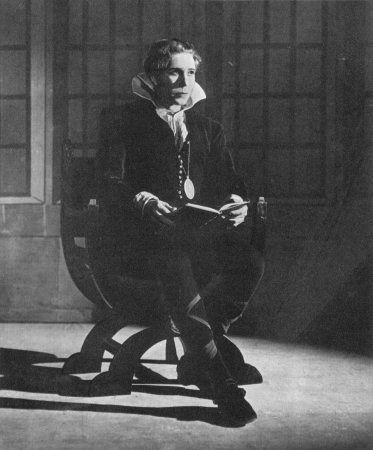
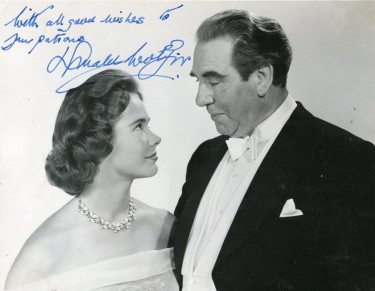
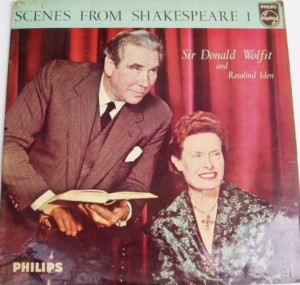
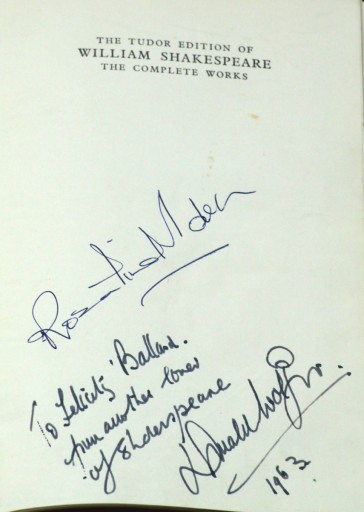
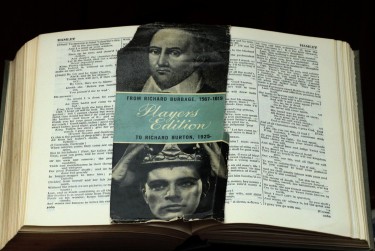
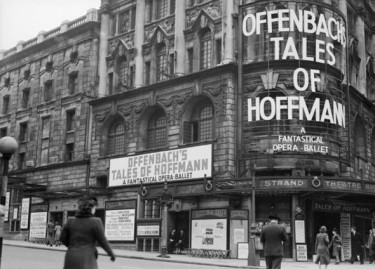
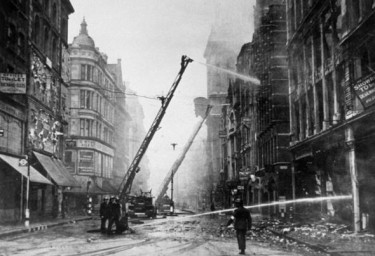
I suspect that rather too many actors of his generation were jealous of his popularity with the British people. He was somewhat an outsider-and all the better for that. RIP
Thanks Bruce. I am sure that you are right – people like Olivier, John Geilgud and Ralph Richardson did not seem to like him – he was as you say, an outsider. He came from a village near Newark in Nottinghamshire and rose to such heights in the acting world. What he did in Wartime was just so admirable bringing Shakespeare to everyone in lunchtime performances to lift the nation’s and the capital’s spirits in such adversity. I have a great regard for him – never saw him act on stage but he made quite few films – some not so good but he probably did that to finance his Theatre Company. Olivier was a jealous and conceited actor – his own son said that when Vivian Leigh, his wife. had received the Oscar for Gone With The Wind he seemed to be smiling but underneath he would be seething that he hadn’t got it.
… [Trackback]
[…] Read More Information here on that Topic: filmsofthefifties.com/sir-donald-wolfit-one-of-the-greatest-stage-actors-of-the-20th-century/ […]
… [Trackback]
[…] Here you can find 55187 more Information on that Topic: filmsofthefifties.com/sir-donald-wolfit-one-of-the-greatest-stage-actors-of-the-20th-century/ […]